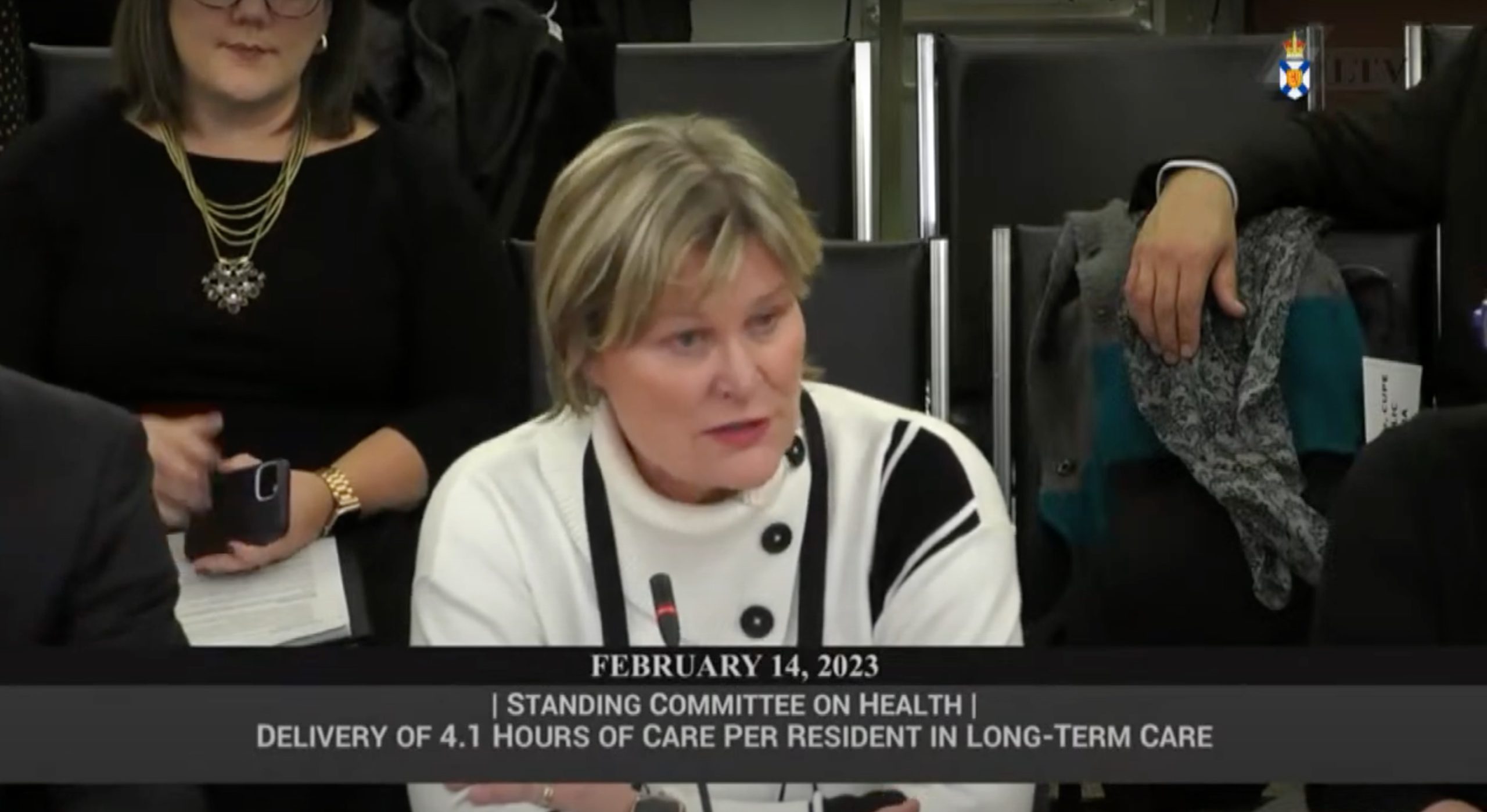Health-care unions call for higher legislated standard in nursing homes
Hazelton says standard of 4.1 hours per resident per day of care should be law

caption
Nova Scotia Nurses’ Union president Janet Hazelton speaks at the legislature's health committee on Feb. 14.The unions representing nurses and continuing care assistants in Nova Scotia are calling for improvements to the province’s long-term care legislation.
At a meeting of the legislature’s health committee on Tuesday, presidents of the Nova Scotia Nurses’ Union and Canadian Union of Public Employees Nova Scotia called on legislators to change the Homes for Special Care Act to support a 4.1-hour per resident per day standard of nursing care.
“We’ve been talking about this since I’ve been president, and that wasn’t yesterday,” said NSNU president Janet Hazelton.
She said recent provincial work has met standards that were set 15 years ago, aligning with calls unions have made for the last decade. “We need to be planning for the needs of residents for the next decade,” said Hazelton.
Work is underway to set new standards for long-term care at a federal level, but regulations at public facilities are within provincial jurisdiction. “They’re not gonna be worth the paper they’re printed on unless provincial governments put them in legislation,” said Hazelton.
Hazelton said that changes need to be made directly in the legislation governing long-term care homes.
“Open the act, modernize the act and make sure that we put adequate care in the act, so that future governments can’t just change it on a whim. That’s what happens when things get expensive,” said Hazelton.
Tracey Barbrick, associate deputy minister in the Department of Seniors and Long-Term Care, said it was within her minister’s mandate to table legislation on long-term care regulations.
When asked by Liberal MLA Brendan Maguire whether her department had worked to draft legislation, Barbrick said the department is working towards implementing the standard into practice and would not comment on the status of legislation.
“Seventy per cent of the facilities that have identified that they have their beds all open, they’re at full complement of staff, and they’re ready to upscale to the 4.1 – they’ve received their funding,” said Barbrick.
Hazelton said the government has made strides to address problems in long-term care, including higher wages for continuing care assistants, more affordable and accessible training for CCAs, and an overall increase in the number of CCAs working in long-term care.
“Sometimes we have registered staff responsible for 40, 50, 60 residents. If it wasn’t for the CCAs, we wouldn’t survive,” said Hazelton. “The CCAs are very good at what they do, but there’s a lot of things that they’re just not educated to do.”
“This government and others have done a really good job of keeping people in their home,” said Hazelton. “As a result of that, when they come to long-term care, they need long-term care.”
“People need to make a decision in this province: We’re either going to invest in long-term care or we’re not,” said Hazelton. “And if we can live with not … let’s tell our seniors that, ‘This is your life.’ ”
CUPE N.S. president Nan McFadgen, whose union represents more than 4,000 CCAs and other staff working in long-term care, told the committee about an experiment her union ran in January 2020. For an entire day, CCAs volunteered time to ensure 4.1 hours of care per day per resident.
“It’s the first time they’ve worked in years where they didn’t cry before they went home,” said McFadgen.
She said CUPE’s experiment shows how an increase could improve the quality of life of both residents in long-term care, and workers.
“That’s more than half of your recruitment [and] retention battle,” said McFadgen.
She said she hopes long-term care in Nova Scotia improves before she has to rely on it.
About the author
David Shuman
David Shuman is a reporter from Musquodoboit Harbour, NS. He works as the editor-in-chief of the Dalhousie Gazette, Dalhousie's independent campus...
